Kangaroo-Courts
Kangaroo-Courts
Kangaroo-Courts
Create successful ePaper yourself
Turn your PDF publications into a flip-book with our unique Google optimized e-Paper software.
<strong>Kangaroo</strong> <strong>Courts</strong>?<br />
25<br />
Naraine to his position in the company. This decision ended a sixteen-year legal battle, the<br />
costs of which have been borne by Ford.<br />
British Columbia Human Rights Tribunal<br />
Nixon v. Vancouver Rape Relief Society (2002)<br />
The complainant Kimberly Nixon, was born a male but began living as a female in 1989,<br />
completing the transition in 1990 by undergoing sexual reassignment surgery. In 1993,<br />
Nixon became a victim of psychological and physical abuse and sought relief by attending<br />
“Battered Women’s Support Services” at the Vancouver Rape Relief Society (“Rape<br />
Relief”). After some time, Nixon wanted to give back to the organization for its help, and<br />
applied to be a peer counsellor for victims of male violence. After holding a pre-screening<br />
process, Rape Relief informed Nixon that she could not be a counsellor because “a woman<br />
had to be oppressed since birth to be a volunteer at Rape Relief,” and that because Nixon<br />
had lived as a man she could not participate, and that “men were not allowed in the training<br />
group.” Rape Relief defended its decision regarding. Nixon by stating that it is entitled to<br />
have a “women only” hiring policy, and to be able to determine who is a woman for the<br />
purposes of this policy.<br />
Nixon filed a complaint with the British Columbia Human Rights Tribunal (BCHRT),<br />
alleging that she had been discriminated against on the basis of sexual orientation. The<br />
Tribunal agreed with Nixon and ordered Rape Relief to accept Nixon as a volunteer<br />
counsellor. This decision was overturned in 2005 by the BC Court of Appeal, which found<br />
in that Rape Relief “was entitled to exercise an internal preference in the group served, to<br />
prefer to train women who had never been treated as anything but female.”<br />
British Columbia Human Rights Tribunal<br />
Asad v. Kinexus Bioinformatics (2008)<br />
Ghassan Asad, a native Jordanian who spent many years in Saudi Arabia, began working<br />
for Kinexus Bioinformatics Corp. (“Kinexus”) shortly after immigrating to Canada. In the<br />
summer of 2001, Asad received his Canadian citizenship and chose to celebrate by<br />
travelling around North America, visiting cities such as New York, Washington, D.C.,<br />
Boston and Detroit. Shortly after returning from his trip, the terrorist attacks of September<br />
11 took place in New York City and Washington D.C. In the weeks that followed, Mr.<br />
Asad claimed that the atmosphere in his work environment had drastically changed as<br />
many had suspected his involvement in the attacks. In fact, one employee was so<br />
concerned about Asad that she or he alerted the RCMP of Asad’s trip to New York City<br />
and Washington. After conducting several interviews with Asad, the RCMP ended their






